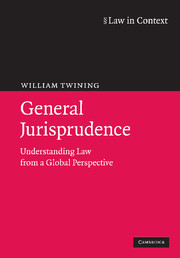Book contents
- Frontmatter
- Contents
- Preface
- Acknowledgements
- List of abbreviations
- Further abbreviations
- Part A
- 1 Jurisprudence, globalisation and the discipline of law: a new general jurisprudence
- 2 Analytical jurisprudence in a global context
- 3 Mapping law: Families, civilisations, cultures and traditions
- 4 Constructing conceptions of law: Beyond Hart, Tamanaha and Llewellyn
- 5 Normative jurisprudence, utilitarianism, and theories of justice
- 6 Human rights as moral, political and legal rights
- 7 Meeting the challenges to human rights: Griffin, Tasioulas and Sen
- 8 Empirical dimensions of law and justice
- Part B
- 14 Conclusion
- Bibliography
- Index
5 - Normative jurisprudence, utilitarianism, and theories of justice
Published online by Cambridge University Press: 05 June 2012
- Frontmatter
- Contents
- Preface
- Acknowledgements
- List of abbreviations
- Further abbreviations
- Part A
- 1 Jurisprudence, globalisation and the discipline of law: a new general jurisprudence
- 2 Analytical jurisprudence in a global context
- 3 Mapping law: Families, civilisations, cultures and traditions
- 4 Constructing conceptions of law: Beyond Hart, Tamanaha and Llewellyn
- 5 Normative jurisprudence, utilitarianism, and theories of justice
- 6 Human rights as moral, political and legal rights
- 7 Meeting the challenges to human rights: Griffin, Tasioulas and Sen
- 8 Empirical dimensions of law and justice
- Part B
- 14 Conclusion
- Bibliography
- Index
Summary
Introduction
Normative jurisprudence encompasses general questions about values and law. It deals with the relations between law, politics and morality, including debates between and among positivists and others about the relationship between law and morals, whether law is at its core a moral enterprise, and about political obligation and civil disobedience. It includes questions about the existence, scope, and status of natural, moral, and non-legal rights; the relationship between needs, rights, interests, and entitlements; theories of justice; constitutionalism and democracy; and standards for guiding and evaluating legal institutions, rules, practices and decisions. Normative jurisprudence now occupies a central place on the agenda of Anglo-American jurisprudence as is illustrated by the attention given to Bentham, Dworkin, Finnis, Rawls, Raz, and modern critical theory. Whether normative theories of reasoning and rationality, and questions of scepticism and relativism about them, are subsumed under normative or analytical jurisprudence is largely a matter of convenience.
This is a vast terrain, rooted in a great heritage of texts, issues, theories, controversies and ideas, many of which are regularly contested. Rather than try to be comprehensive, I shall focus on some familiar mainstream ideas within the Western tradition in order to show how adopting a global perspective requires at least some adjustment of the focus and agendas and debates of normative legal theory. By way of illustration this chapter concentrates on Utilitarianism as exemplified by Bentham and Singer, Kantianism as exemplified by Rawls and Pogge, and modified utilitarianism as exemplified by Hart and Sen.
- Type
- Chapter
- Information
- General JurisprudenceUnderstanding Law from a Global Perspective, pp. 122 - 172Publisher: Cambridge University PressPrint publication year: 2009

